Pete York of The Spencer Davis Group
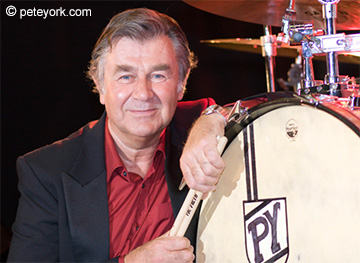
INTERVIEW
The Spencer Davis Group was one of the most admired and influential bands to come out of Birmingham in the 1960s. They were also one of the most successful with internationally known hit records like 'Keep On Running', 'Gimme Some Loving', and 'I'm A Man'. While group member Steve Winwood later enjoyed huge solo success, drummer Pete York also went on to play with some of the biggest and most respected names in the music business.
I am very fortunate to recently interview Pete who graciously answered my questions to him that I'm sure will be of interest to fans of the BrumBeat web site. The following is my interview with Pete York and is exclusive to BrumBeat.net as follows;
JW: Where were you born and where did you grow up and go to school?
PY: I was born in Middlesbrough General on August 15, 1942, but we lived in nearby Redcar. We were often on the move because my Dad worked in the iron and steel industry, first to Millom and then to Renishaw near Sheffield where I went to the village school. At the age of 8, I started at Mount St Mary's near Chesterfield and then on to Nottingham High School and finally Trent College.
JW: Were there any musicians in your family and did you get much encouragement from your parents or family members?
PY: My grandmother loved to play the piano in her house and my mother loved music, like Sinatra and Benny Goodman. My father didn't understand my fascination at all.
JW: How old were you when you started playing drums and what made you want to become a drummer?
PY: I was around 8 years old when I started banging on household items while listening to the radio. I heard Gene Krupa with Benny Goodman and that set me off. When I got to see him on film that really did it.
JW: Do you remember your first drum set?
PY: It began with pots and pans from the kitchen and then I bought a cheap snare drum with my savings from pocket money. By the time I left school I had some Olympic drums and when I met Spencer I had a Premier set.
JW: What were your early musical influences?
PY: Definitely jazz and swing music. There was very little rock on the radio until Bill Haley had his hits. My early influences - Armstrong, Basie, Ellington, are still very strong in me. I love them and listen to them to this day. In my 50 odd years as a pro I have even got to play with some of those band members. That's been much more of a thrill to me than touring with the Rolling Stones or jamming with Jimi Hendrix or getting drunk with Janis Joplin. No disrespect to anyone, but old musicians will appreciate how I feel.
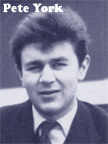
JW: Can you remember any details about your first gig and who you played it with?
PY: It was in Birmingham in 1960 with a swinging sextet and the bandleader was Eddie Matthews. The gig paid 15 shillings and a bottle of brown ale!
JW: When did you first go to Birmingham and why did you go there?
PY: My father decided I should go to train as "something" in industry and I went to GKN (Guest, Keen and Nettlefolds) in Birmingham, an enormous screw factory. I learned everything about screws and screwing in these years at the beginning of the 60s. As mentioned above, I very quickly connected with some good musicians and started playing gigs, often at Birmingham University where Spencer Davis was Secretary of the Rhythm Club.
JW: Were you a student at Birmingham University?
PY: I was never a student there, I actually took day release classes at the College of Commerce. But I did play with the university jazz band under the name of Harry Beaufort and we won the National Jazz Band Competition in 1963 with our sextet led by Eddie Matthews. When we returned to Brum with the trophy we were featured on BBC TV, my first appearance on television.
JW: What was your impression of the Birmingham jazz scene?
PY: There was a lot going on, so many sessions in pubs mostly. There was a trad scene, the New Orleans purists, other bands like George Huxley who played a more Chicago style, mainstream/modern bands, some bebop cats. Everything from Jelly Roll to Cannonball. And this was a time when the jazz tours were happening with all the big names. You could see Basie at least once a year. I went to everything. Sometimes my mother would come over from Nottingham on the train and we would meet in the cinema cafe at the Odeon New Street. Once she got there before me and had been having coffee with Billy Strayhorn and Harry Carney. Was I jealous?
JW: How did you meet Spencer Davis?
PY: Spencer was active in the University Rhythm Club and would sing with the dixieland band and also do his own spot in the interval, old blues songs, Leadbelly, Big Bill Broonzy etc. I would often sit in with them even though I played mainly with the modern sextet doing Horace Silver and Adderley type stuff.
JW: Do you remember your first meeting with Steve and Muff Winwood?
PY: We met at "The Chapel", which was a Saturday afternoon jam for all-comers in an old church in the Birmingham city centre. This was an amazing scene and not for the faint hearted. The pro big band guys used to come down for some fun and they could really play.
Muff arrived with Steve in tow and said; "Can my brother sit in on piano?" We thought we were pretty cool so it was, "You tell us, can he?" so Steve sits down, a schoolboy really, and plays with such sureness. Every note in the right place and the right choice of note. I later played occasionally in their own band, the 'Muff Woody Jazz Band', which had a wonderful wide repertoire of good tunes, from Stan Kenton to Ray Charles.
JW: Was there a point you realized something special was going on with the early Spencer Davis Group line-up (Rhythm & Blues Quartette)?
PY: The first gigs we played often included extra guys like Don Campbell and Mike Burney (later of Wizzard) playing horns, so we were quite jazzy, which I loved. Also Steve began playing guitar as well as piano and organ. This, added to his mature vocalizing, made the group something special.
We did so many club gigs and developed quite a show which was basically R&B, (I mean the real thing, not the travesty the name has become today) but with jazz and even comedy songs from me thrown in. We all did our bit and had a huge following in Birmingham. When our first single 'Dimples' came out in Spring 1964 it went straight to Number One in the Birmingham Mail chart, over the Beatles, Stones, all of them.
JW: Do you remember your first experience in a recording studio?
PY: Our very first time was cutting some demos at Hollick and Taylors in Birmingham. We made five tracks and five 10" discs were pressed. I have the only one left and I only let close friends hear it because it's quite primitive. But it's all there.
JW: What was your impression of Chris Blackwell?
PY: The epitome of cool. The sort of guy who walks into the Dorchester in tennis shoes. That's how our wives and girlfriends of the time saw him. They persuaded us he was the one for us. He built his empire on the backs of us and Millie Small and, like so many, abandoned us when we were of no further use. Which was how he probably saw Spencer and I when Steve decided to leave. I was brought up in a decent family environment and there was a certain honor among us schoolboys that did not prepare me for the selfishness and ripping off which was rife in business and, particularly, our business.
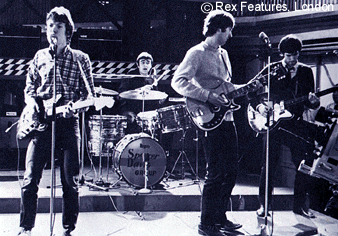
JW: How did you feel when you became a "pop star". Was it something you were comfortable with?
PY: I was very comfortable with it. Enjoyed every minute. We never had bodyguards and the fans were just great. I will never hear a negative word about groupies. As far as I'm concerned they provided warmth and affection with no strings. I don't think I ever got a superior attitude about myself because when I listened to my jazz heroes I was constantly reminded of how much more I needed to learn to be one of them. Listening to or watching Buddy Rich was humbling experience for any drummer, unless he was a complete idiot.
JW: Was there a time you felt your skill as a drummer was suffering because of pressure from being famous?
PY: No. When we were at our peak in 1966, the afore-mentioned Buddy Rich began his annual visits to the UK. That's when I realized I had so much more to learn. I started daily practicing then and I'm still doing it now. I would have been a fool to have thought, well here I am, Number One around the world with 'Gimme Some Lovin'. I've got it made, I've arrived. Just have fun. 50 years later I can say to myself, I play more music better now than I could have done then. That's what matters to me.
JW: You played on so many great records with the Spencer Davis Group. Is there any recordings with them you are particularly proud of in terms of the drumming or arrangement?
PY: Oddly enough, a couple of the B-sides, allowed us to stretch out a bit more. They were often just jams to fill up the space. They had names like 'Stevie's Groove' or 'Blues In F'. I'm happy with all of the material we did then, about 43 tracks with Steve I think.
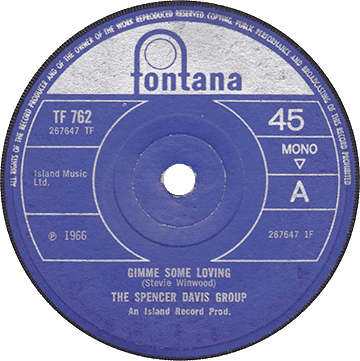
JW: Are there any gigs you played with the SDG that are particularly memorable to you?
PY: The Record Star Shows from Wembley used to raise money for spastics I think and they were spectacular. Every big name from the Beatles, Stones and on down the list would appear and play a couple of numbers. The biggest TV stars of the day would greet the audience, selling programs etc. Everybody mucking together to make an unforgettable day. The back-stage bar was a riot. I remember Brian Jones buying me several drinks.
JW: Did you ever meet or become friends with Rolling Stones drummer Charlie Watts who came from a similar jazz background to yourself?
PY: Yes, we toured together and I played his drums before he came on. We have occasionally run into one another over the years and I wish it was possible to hang out with him more. He loves his jazz like I do and we chatter away happily. He is a delightful man and understands completely what a drummer's job is. In the words of Artie Shaw, "a drummer should keep time and help". So simple and beautiful.
JW: Did you ever tour the USA with the original line-up of the SDG?
PY: Never. We had offers but Spencer and I always thought that the management wanted to keep Steve back for something bigger. When we did go, without Steve, in 1968, we got another shock. Nothing worked over there without some sort of co-operation from the wise guys.
JW: Was there noticeable competition for the vocal spotlight between Spencer Davis and Steve Winwood?
PY: I think it was hard for Spencer to come to terms with Steve's great talent. Competition would have been pointless. Spencer used to feature on two or three numbers in the show which he performed well, but the fans, especially the girls, just loved Steve.
JW: Do you remember auditioning Elton John as Steve Winwood's replacement?
PY: I wasn't there on that day. I think Terry Reid also turned up. I understand that Elton and Bernie Taupin were really hustling their songs. Being turned down must have been a real blow to his career!
JW: Did you enjoy or approve of the new progressive-sounding musical direction of the SDG after Steve and Muff left?
PY: With the departure of Muff and Steve we lost some of the blues and jazz feeling, and psychedelic music was emerging around us. I didn't mind any of that, I just played what I felt fitted or helped. I was never interested in drugs so I didn't know what an acid-head felt like.
JW: An instrumental track titled 'Alec In Transitland' on the Spencer Davis Group album "With Their New Face On" has you playing a drum solo. Was there much opportunity for you to play solos on stage with the SDG?
PY: I never played solos in the original line-up, maybe four bar breaks here or there, but the second band with Eddie and Phil opened that up for me. Jamming with Eddie Hardin gave rise to the 'Beatles Medley' which had lots of drum soloing in it. By this time I had some chops. When Eddie and I played this as a duo during the Spencer Davis show we got standing ovations, especially on the US tours.
JW: What did you think of Traffic's first album?
PY: I have to confess I never heard it back then. There was a lot of resentment and disappointment after the break-up. Much like a marriage going wrong. Steve was off having fun with his new mates and everybody was telling Spencer and I we were finished. Not a good time.
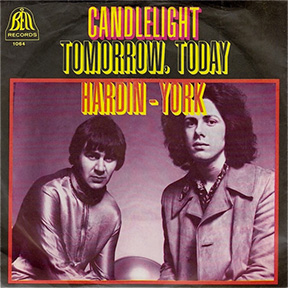
JW: When you left the Spencer Davis Group with Eddie Hardin, did you already have plans to form a group with him or did this come later?
PY: No, we both left at the same time for different reasons. Ray and Spencer probably thought I was too jazzed out to be a real rocker, whatever that's supposed to be. I was getting strange vibes from them and we weren't having hits. Eddie was just becoming fed up. Months went by and we met up in The Speakeasy by chance. Our duo had been so well received we decided to try it as an act together. We liked each other and respected each others playing. We could improvise the hell out of anything.
JW: Did you contribute to the songwriting in Hardin and York?
PY: I brought in some ideas which we turned into songs or instrumentals but Eddie was very prolific. He enjoyed writing more than anything, I think. Or he was clever enough to realize that's where the real money is.
JW: How would you describe the music of Hardin and York, e.g. progressive, jazz, rock?
PY: All of those. It was the most creative environment I've ever worked in. Sometimes the big numbers like 'The Pike' went on for half an hour during live shows. I'm not saying that's necessarily a good thing but it's certainly fun to stretch out and let the imagination roam.
JW: How did your association with Jon Lord (of Deep Purple) come about?
PY: We had known each other for a while and he had recorded the "Concerto" (for Group and Orchestra) with Ian (Paice) playing drums. Jon was planning a new work , "Windows", and needed a drummer who could read music. We recorded and played shows with that in 1974, during which I met my wife, Mecky, in Munich. In 1975 we recorded "Sarabande" with orchestra. We stayed friends until his sad death and played together many times including his last band The Jon Lord Blues Project, whose sensational personnel I put together for him.
JW: What did you do in the years after performing with Hardin and York?
PY: I played with Chris Barber, Klaus Doldinger, Brian Auger and a host of great jazz and blues stars. I had my own bands and wrote, presented and played in a TV series called "Super Drumming" in Germany. To date this is the only TV series on a national channel dedicated to drumming and the percussive arts anywhere in the world. We showcased around twenty of drumming's most influential figures during our three season run.
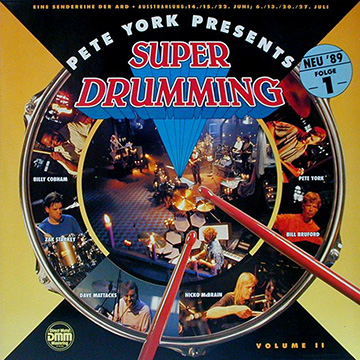
JW: Do you still keep in touch with any of your old band mates from the Spencer Davis Group?
PY: I am on friendly terms with Spencer, Muff and Steve. Occasionally we get to see each other. Eddie has passed on, to my great regret, but I talk to Phil Sawyer. I don't understand why Chris Blackwell doesn't call to invite me to one of his Caribbean hotels. I reckon I own a bathroom or two to say the least!
JW: You mentioned in your latest website blog the current depressed state of live music and the record business. Do you have any advice for drummers who'd like to make a living working in the music business today?
PY: To make a decent living out of music so that you can bring up a family is becoming increasingly impossible. But musicians are dreamers and we love to play, however lousy the deal is. My advice would be to take a look at the whole century old story of playing the drum set. Get inspired by a range of players and distill their styles into one of your own by infusing some crazy ideas of your own.
You can have fun and make a living by being in a touring act but you must fit in. Tread carefully and don't bruise the singer's ego. Don't play a solo unless you're asked. Stop it when told - unless you are also the singer and it's your band. Better still, have a well-paying day-job like hedge-fund clipper, expense fiddling politician, safe cracker, super model (not only girls but some TG boys do very well with this), star footballer (not only boys but some TG girls do very well with this) or psychiatrist!
I would like to thank Pete York very much for his time doing this interview. Pete is still very active in drumming today and has his own terrific web site at: www.peteyork.com where you can find all the latest news about Pete.
Copyright © 2016 John R WoodhouseShow your support to re-unite the original line-up of the Spencer Davis Group for a performance at Birmingham Town Hall by clicking HERE